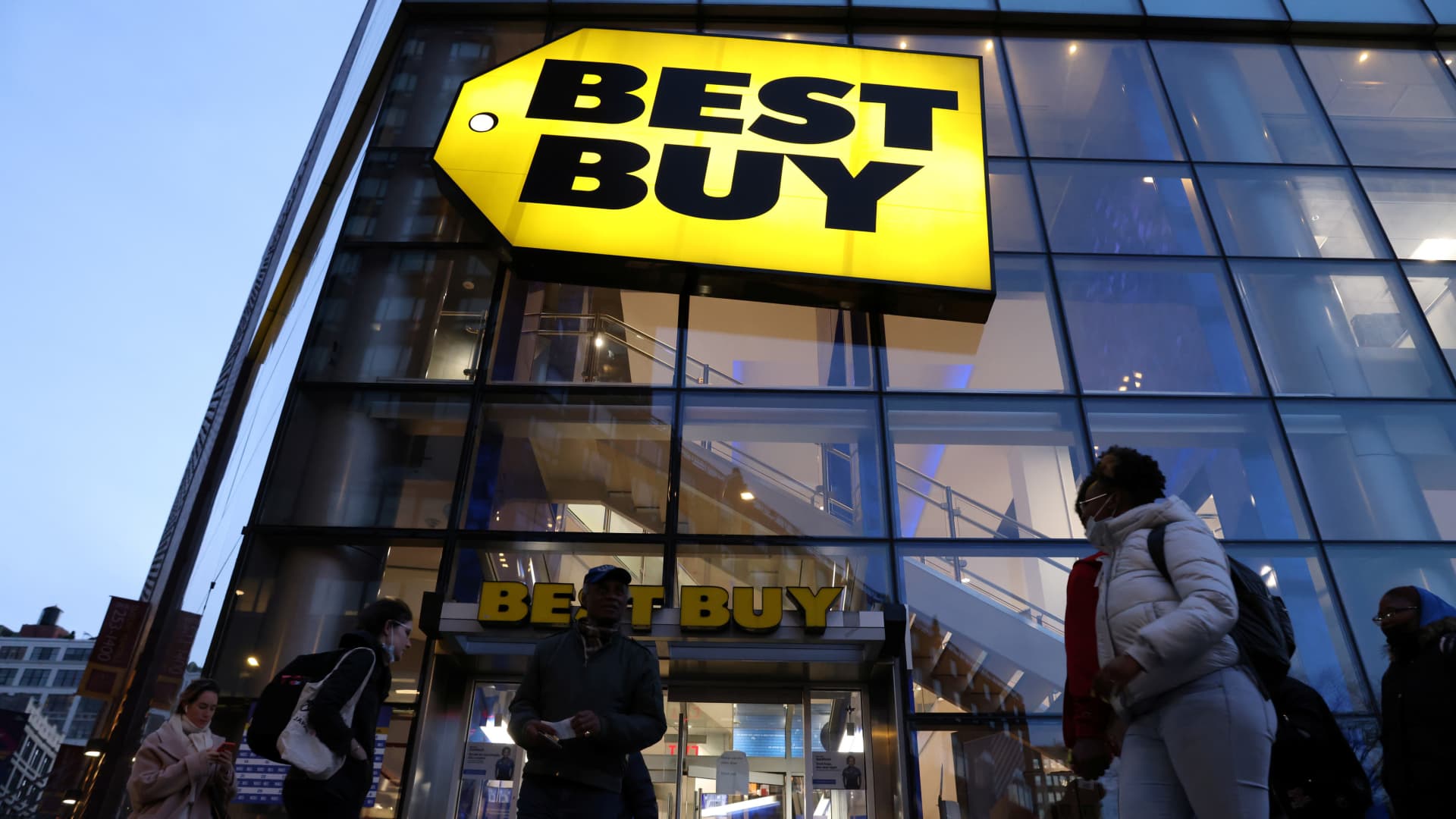Best Buy surpassed Wall Street’s revenue and earnings expectations for the holiday quarter on Thursday, even as the retailer navigated through a period of tepid consumer electronics demand and guided for a softer year ahead.
For this fiscal year, Best Buy anticipates revenue will range from $41.3 billion to $42.6 billion. That would mark a drop from the most recently ended fiscal year, when full-year revenue totaled $43.45 billion. It said comparable sales will range from flat to a 3% decline.
One challenge that will affect sales in the year ahead: it is a week shorter. Best Buy said the extra week in the past fiscal year lifted revenue by about $735 million and boosted diluted earnings per share by about 30 cents.
In a news release Thursday, CEO Corie Barry said Best Buy expects the coming year to be one “of increasing industry sales stabilization.”
She said the company is “focused on sharpening our customer experiences and industry positioning,” along with driving up its operating income rate. That metric is expected to improve in the coming year, as Best Buy benefits from changes to its annual membership program, a newer moneymaker for the retailer.
Shares of Best Buy rose nearly 5% in premarket trading following the report.
Here’s what the consumer electronics retailer reported for its fiscal fourth quarter of 2024 compared with what Wall Street was expecting, based on a survey of analysts by LSEG, formerly known as Refinitiv:
- Earnings per share: $2.72, adjusted vs. $2.52 expected
- Revenue: $14.65 billion vs. $14.56 billion expected
Best Buy has dealt with slower demand in part due to the strength of its sales during the pandemic. Like home improvement companies, Best Buy saw outsized spending as shoppers were stuck at home. Plus, many items that the retailer sells like laptops, refrigerators and home theater systems tend to be pricier and less frequent purchases.
The retailer has cited other challenges, too: Shoppers have been choosier about making big purchases while dealing with inflation-driven higher prices of food and more. Plus, they’ve returned to splitting their dollars between services and goods after pandemic years of little activity.
Even so, Best Buy put up a quarter that was better than feared. In the three-month period that ended Feb. 3, the company’s net income fell by 7% to $460 million, or $2.12 per share, from $495 million, or $2.23 per share in the year-ago period. Revenue dropped from $14.74 billion a year earlier.
Comparable sales, a metric that includes sales online and at stores open at least 14 months, declined 4.8% during the quarter as shoppers bought fewer appliances, mobile phones, tablets and home theater setups than the year-ago period. Gaming, on the other hand, was a strong sales category in the holiday quarter.
In the U.S., Best Buy’s comparable sales dropped 5.1% and its online sales decreased by 4.8%.
During the quarter, traditional holiday shopping days were Best Buy’s strongest, CFO Matt Bilunas said on the company’s earnings call. Comparable sales were down 5% year over year in November but down just 2% in December around the gift-giving holidays. January was the weakest month during the quarter with comparable sales down 12%, he said.
As shoppers buy fewer new items, Best Buy’s revenue has gotten a boost from its services business, which includes annual fees from its membership program, in-home installation and repairs. It’s a growth area that the company expects will persist in the coming year.
There are some signs the replacement cycle has started to pick up again, too, Barry said on the earnings call. For example, she said, year-over-year comparable sales for laptops turned positive in the fiscal fourth quarter and have remained positive in the first quarter.
Barry also cited positive indicators including cooling inflation and “green shoots” in the housing market. Sales at Best Buy are not directly correlated to the housing market, which has seen slower turnover, but home purchases do tend to spur appliance and TV purchases, she said.
Best Buy paid dividends of $198 million and spent $70 million on share buybacks during the period. On Thursday, the company said its board of directors had approved a 2% increase in the regular quarterly dividend to 94 cents per share, which will be paid in April.
As of Wednesday’s close, Best Buy’s stock is up nearly 2% so far this year. The company has underperformed the approximately 6% gains of the S&P 500 during that period. Shares of Best Buy closed at $79.68 on Wednesday, bringing the company’s market value to $17.16 billion.
Don’t miss these stories from CNBC PRO:

